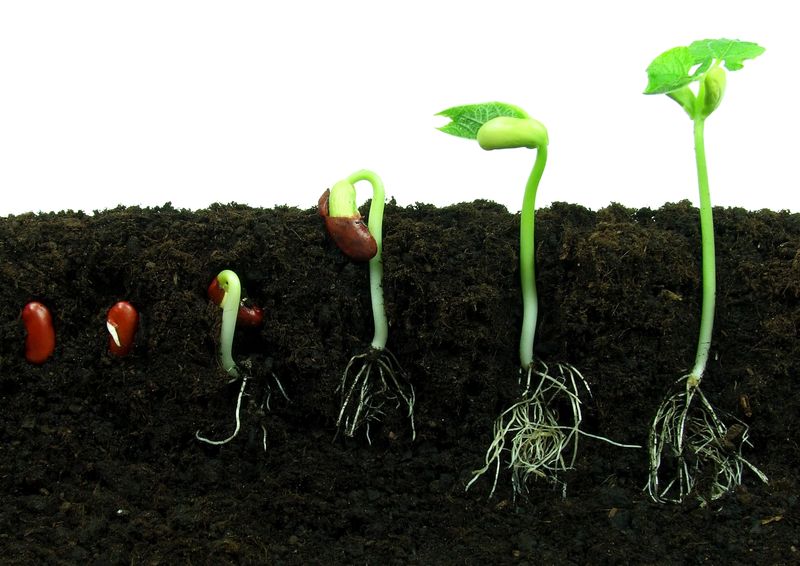
Theme: Unless a Grain of Wheat Dies
READINGS: Jeremiah 31:31-34, Hebrews 5:7-9, John 12:20-33
5th Sunday of Lent
The New Covenant God had promised through his prophet (Jer. 31:31-34) was to be sealed by the blood of his Son, our Lord Jesus Christ. In the gospel reading, Jesus spoke figuratively of his impending sacrificial death and the fruit of salvation that would come out of it for all mankind:‘unless a grain of wheat falls to the ground and dies, it remains only a single grain; but if it dies, it yields a rich harvest’ (Jn. 12:24).
Right after the above statement, our Lord added: ‘anyone who loves his life loses it; anyone who hates his life in this world will keep it for the eternal life’ (Jn. 12:25). In other words, each of us is supposed to be a grain that falls to the ground, dies and produces much grain. Let us, therefore, use the process of sowing a seed and its growth and fruition to learn how we can also die to this world and produce a rich harvest for life in heaven.
DIGGING OF THE GROUND: As we usually dig the ground to sow a seed, so the meaning of life [Why are we here on earth? Where are we going?] is deeper than is obvious. There is more to life than we experience on earth.
PLACEMENT OF SEED AND COVERING WITH SOIL: As the seed, covered with some soil, is surrounded by darkness, so the seed of our faith is surrounded by ‘darkness’. This means that we see the future glory God has promised us not by our physical sight but by the ‘darkness of faith’. In other words, even by our faith, we cannot fully comprehend, in this life, the mysteries and blessings of God. St. Paul puts it this way: ‘for now we see in a mirror, dimly, but then face to face; now I know partially, but then I shall know just as I am known’ (1 Cor. 13:12). St. John, in turn, says: ‘beloved, now we are children of God; and it has not yet been revealed what we shall be, but we know when he is revealed we shall be like him, for we shall see him as he is’ (1 Jn. 3:2).
WATERING OF THE SEED AND PLANT: As the farmer may depend on rainfall for the germination and growth of the seed, so the seed of our faith sown in this life requires the grace of the Living Water, the Holy Spirit, to germinate and grow.
ROTTING PROCESS: Beloved, as the seed has to rot or die, so we are to die to sin (cf. Rom. 6:7) and, sometimes, to the sufferings of life.
GERMINATION: Germination is an observable sign of a new life of the seed that was sown. Similarly, when the seed of our faith continuous to receive the watering of the Holy Spirit and we die to this world, others may begin to observe the freshness of our new life in Christ: they may see that we have abandoned our old way of life and have embraced the new life of good deeds, prayer, active participation in church, etc.
CARING FOR THE SEEDLING AND PLANT: The germination is just the beginning. As the farmer has to continue to take care of the seedling and the plant, by weeding, tilling the soil, watering, clearing of rubbish, etc. so we need to weed with the Word of God, till the soil of our faith with prayer, water with the Sacraments of Grace, clear the rubbish of bad deeds with good deeds, etc.
FRUITION: With the continuous reception of the grace of God and our constant cultivation of the plant of our faith, we may produce many grains or fruits. St. Paul mentions some of the grains/ fruits we may produce: ‘love, joy, peace, patience, kindness, goodness, faithfulness, gentleness and self-control’ (Gal. 5:22).
CONCLUSION – HARVESTING: Such are the fruits God enjoys! And so when we produce them his angels would harvest them for the banquet of heaven. In Ghana, only the best of some of our fruits (e.g. pineapples, bananas) can be exported to Europe, because that market demands high quality of fruits. Beloved, the market of heaven demands a higher quality, indeed, the highest quality of the fruits of our faith. So I pray that we would produce fruits of faith whose quality meets the market of heaven, and may they be so delightful to the Lord God that they would end up right on his banquet table! Amen!
By Very Rev. Fr. John Louis
